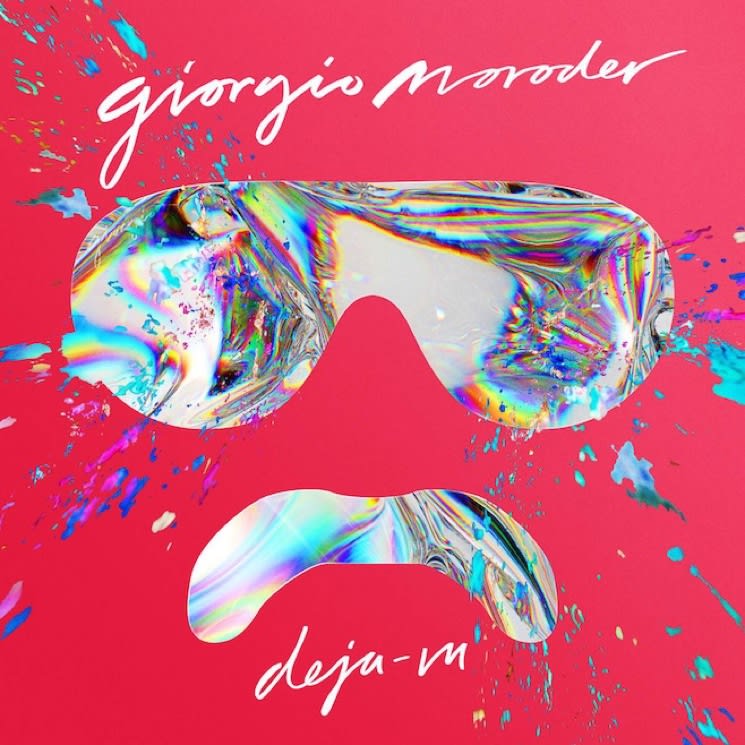Giorgio Moroder has had an amazing re-emergence. The man who helped establish disco music with some of the biggest hits of the late '70s and early '80s left it behind when he felt finished, opting to play a lot of golf. But thanks to numerous tributes and a massive co-sign by Daft Punk, the Italian producer is cashing in on his good name with a new solo album.
For his first album in over 30 years, Moroder enlisted a list of pop heavyweights to work wonders on the record. Déjà Vu certainly doesn't sound like a relic from the past; Moroder making the decision to create a modern-sounding record in a lot of ways meant avoiding the possibility of rehashing his past work. In fact, it sounds a little too modern at times; the huge and busy production makes the album feel less effortless than his early work, and more calculated: opener "4 U With Love" sounds like generic, crowd-pleasing EDM, its lead snaking its way through chord progressions you've likely heard a million times before elsewhere. Tracks that fail to lift off, such as "Don't Let Go" and "I Do This For You," sound more like attempts to gatecrash mainstream dance than an attempt at any sort of innovation. From someone like Moroder, this shouldn't be.
Yet when the album works, and Moroder fully engages with his collaborators, the results are fantastic. Britney Spears turns in an understated performance on "Tom's Diner," over production from Moroder that is neither brash nor frail. There are moments, too, that remind you that you're listening to one of the pioneers in dance music, such as the unmistakeable vocoder on "74 is the New 24," or the guitars on "Right Here, Right Now." Charli XCX guests on "Diamonds," a thoroughly uplifting jam with background synth bass gurgles that aren't too far away from what Moroder did years ago on "I Feel Love."
There are misfires, sure, but Déjà Vu is more than a generic cash grab. There's fun to be had in how Moroder approaches his collaborations with singers, and it's telling that he forewent disco, a sound he invented and left behind, for something more modern. Still, one wonders what could have happened if Moroder explored a little more, rather than playing it safe.
(RCA)For his first album in over 30 years, Moroder enlisted a list of pop heavyweights to work wonders on the record. Déjà Vu certainly doesn't sound like a relic from the past; Moroder making the decision to create a modern-sounding record in a lot of ways meant avoiding the possibility of rehashing his past work. In fact, it sounds a little too modern at times; the huge and busy production makes the album feel less effortless than his early work, and more calculated: opener "4 U With Love" sounds like generic, crowd-pleasing EDM, its lead snaking its way through chord progressions you've likely heard a million times before elsewhere. Tracks that fail to lift off, such as "Don't Let Go" and "I Do This For You," sound more like attempts to gatecrash mainstream dance than an attempt at any sort of innovation. From someone like Moroder, this shouldn't be.
Yet when the album works, and Moroder fully engages with his collaborators, the results are fantastic. Britney Spears turns in an understated performance on "Tom's Diner," over production from Moroder that is neither brash nor frail. There are moments, too, that remind you that you're listening to one of the pioneers in dance music, such as the unmistakeable vocoder on "74 is the New 24," or the guitars on "Right Here, Right Now." Charli XCX guests on "Diamonds," a thoroughly uplifting jam with background synth bass gurgles that aren't too far away from what Moroder did years ago on "I Feel Love."
There are misfires, sure, but Déjà Vu is more than a generic cash grab. There's fun to be had in how Moroder approaches his collaborations with singers, and it's telling that he forewent disco, a sound he invented and left behind, for something more modern. Still, one wonders what could have happened if Moroder explored a little more, rather than playing it safe.
